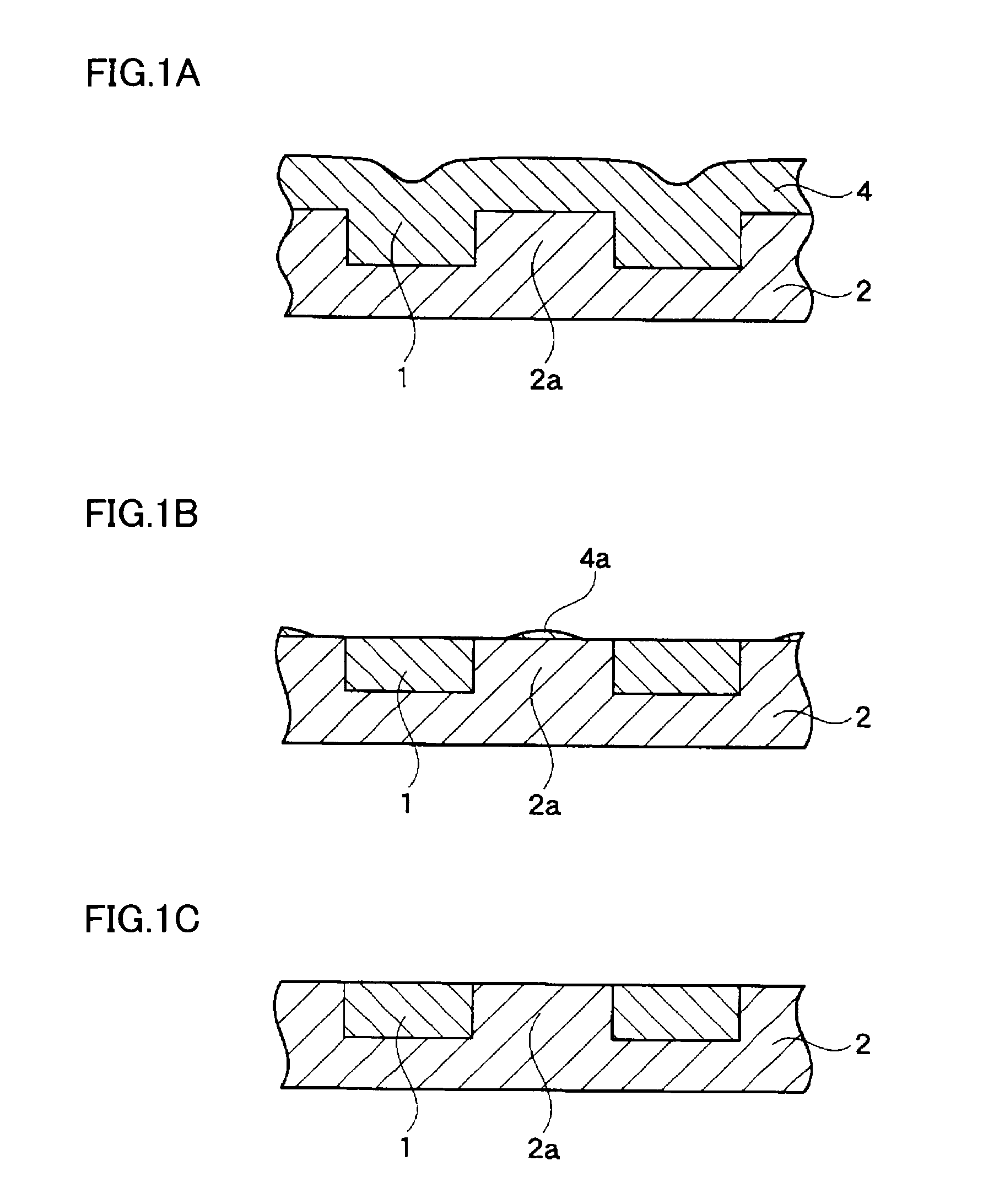Chemical mechanical polishing aqueous dispersion, chemical mechanical polishing method using the same, and method of recycling chemical mechanical polishing aqueous dispersion
a technology of mechanical polishing and aqueous dispersion, which is applied in the field of chemical mechanical polishing method using the same, and method of recycling chemical mechanical polishing aqueous dispersion, can solve the problems of significant deterioration of polishing performance after recycling as compared with initial polishing performance, and the deterioration of polishing performance when polishing waste. , to achieve the effect of excellent polishing performance, simple process
- Summary
- Abstract
- Description
- Claims
- Application Information
AI Technical Summary
Benefits of technology
Problems solved by technology
Method used
Image
Examples
first embodiment
1.1 First Embodiment
[0045]A chemical mechanical polishing aqueous dispersion according to a first embodiment of the invention includes (A) abrasive grains, (B) an organic acid, and (C1) copper ions, the chemical mechanical polishing aqueous dispersion including the copper ions (C1) at a concentration of 1×101 to 2×105 ppm. Each component of the chemical mechanical polishing aqueous dispersion according to the first embodiment is described in detail below. Note that the abrasive grains (A), etc., may be referred to as a component (A), etc.
1.1.1 Abrasive Grains (A)
[0046]The chemical mechanical polishing aqueous dispersion according to the first embodiment includes the abrasive grains (A). The chemical mechanical polishing aqueous dispersion may include at least one type of abrasive grains selected from inorganic particles and organic particles as the abrasive grains (A). Examples of the inorganic particles include silica, alumina, titania, zirconia, ceria, and the like. Examples of th...
second embodiment
1.2 Second Embodiment
[0065]A chemical mechanical polishing aqueous dispersion according to a second embodiment of the invention includes (A) abrasive grains, (B) an organic acid, and (C2) at least one kind of metal atoms selected from Ta, Ti, and Rb, the chemical mechanical polishing aqueous dispersion including the at least one kind of metal atoms (C2) selected from Ta, Ti, and Rb at a concentration of 1×10−1 to 1×103 ppm.
[0066]Each component of the chemical mechanical polishing aqueous dispersion according to the second embodiment is described in detail below.
1.2.1 Abrasive Grains (A)
[0067]The chemical mechanical polishing aqueous dispersion according to the second embodiment includes the abrasive grains (A). The abrasive grains (A) described in connection with the first embodiment may be used as the abrasive grains (A) in the second embodiment. Therefore, description thereof is omitted.
1.2.2 Organic Acid (B)
[0068]The chemical mechanical polishing aqueous dispersion according to t...
fourth embodiment
2.2 Fourth Embodiment
[0116]A method of recycling a chemical mechanical polishing aqueous dispersion according to a fourth embodiment is a method of recycling a chemical mechanical polishing aqueous dispersion by utilizing a liquid waste that is discharged after polishing a barrier metal film that includes at least one metal selected from Ta, Ti, and Rb by using the chemical mechanical polishing aqueous dispersion, the chemical mechanical polishing aqueous dispersion including at least (A) abrasive grains, (B) an organic acid, and (C2) at least one kind of metal atoms selected from Ta, Ti, and Rb, the chemical mechanical polishing aqueous dispersion including the at least one kind of metal atoms (C2) selected from Ta, Ti, and Rb at a concentration of 1×10−1 to 1×103 ppm, the method including (a) collecting the liquid waste, and (b) removing coarse particles from the liquid waste.
[0117]The method of recycling a chemical mechanical polishing aqueous dispersion according to the fourth e...
PUM
| Property | Measurement | Unit |
|---|---|---|
| particle diameter | aaaaa | aaaaa |
| particle diameter | aaaaa | aaaaa |
| particle diameter | aaaaa | aaaaa |
Abstract
Description
Claims
Application Information
 Login to View More
Login to View More - R&D
- Intellectual Property
- Life Sciences
- Materials
- Tech Scout
- Unparalleled Data Quality
- Higher Quality Content
- 60% Fewer Hallucinations
Browse by: Latest US Patents, China's latest patents, Technical Efficacy Thesaurus, Application Domain, Technology Topic, Popular Technical Reports.
© 2025 PatSnap. All rights reserved.Legal|Privacy policy|Modern Slavery Act Transparency Statement|Sitemap|About US| Contact US: help@patsnap.com



